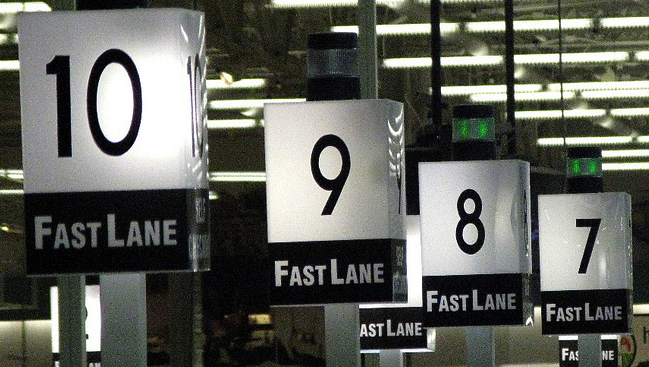FCC Makes Mockery Of Net Neutrality With Proposal To Allow Internet “Fast Lanes”
The original neutrality rules — which were gutted by a federal appeals court earlier this year, not because they were bad but because of a nitpicky classification oversight made by an FCC in the ages of dial-ip — prevented ISPs from either crippling or prioritizing users’ access to content. These companies were to simply be conduits that carried data back and forth as quickly and efficiently as they could without regard to its source.
That’s why it was called “net neutrality.”
But according to multiple news reports, Chairman Wheeler’s new proposal won’t simply correct the classification error that allowed Verizon to successfully challenge the old Open Internet rules. The draft he’ll be passing around the FCC office on Thursday reportedly keeps the “no crippling” aspect of the former guidelines, but does away with the “no prioritization” part, meaning Verizon, Time Warner Cable, Charter, AT&T, Charter, etc. can all decide that companies wanting quality access will have to pay for it.
[It’s worth noting that Comcast will presumably not be able to partake in this money-minting new development, as it is legally bound to abide by the old neutrality rules through 2018 (though honestly, we wouldn’t be surprised at this point if Wheeler gave Kabletown a pass).]
So why is this fast lane news such a bad deal?
Here are three reasons that quickly come to mind:
1. No Incentive To Improve Service
Right now, ISPs are racing to keep up with the growing popularity of bandwidth-heavy content, not just from Netflix, but from every pay-TV operator, Amazon, Google, Apple, countless smaller streaming services, online gaming, video teleconferencing, audio streaming, and more. But adding a fast lane takes away much of the incentive to make future innovations available to consumers at large.
The idea of net neutrality meant that ISPs are motivated to provide the best service for as many customers and content providers as possible. But if there is big money to be made off of deep-pocketed media companies trying to outperform each other online, that’s where the focus will go.
If fast lanes are approved, those content companies unwilling or unable to pay extra for improved delivery will be stuck with the status quo, while those who can part with the cash will see the benefits that everyone would have enjoyed had true neutrality been established.
2. The Fight Is Fixed
Compared to many other industries, the cost for entry into the various online markets is relatively affordable — and that level-ish playing field has resulted in numerous risky and visionary online ventures that have offered consumers choice and value.
But fast lanes will now allow ISPs to determine the price startups must pay if they want to reach consumers. It turns ISPs from the providers of neutral pipelines to the arbiters who which companies succeed and which go under.
“The FCC is inviting ISPs to pick winners and losers online,” writes Michael Weinberg of Public Knowledge. “This is not net neutrality. This standard allows ISPs to impose a new price of entry for innovation on the Internet.”
3. You’ll Pay The Price
The most commonly heard refrain from supporters of fast lanes is that bandwidth-heavy content companies should be the ones who foot the bill. That’s like a supermarket telling the maker of a popular brand of potato chips that it needs to help pay the store’s employees because they’re always having to re-stock the shelves.
The fast lanes attempt to put lipstick on this pig by saying “We’re not forcing anyone to do this… These companies are voluntarily paying for the improved content delivery.”
Sadly, there are numerous analogs to this notion in supermarkets and almost every other retail operation. A food company will pay for prime placement on the shelves, or for an end-cap placement to stand out from the rest of the stuff in the crowded aisles. That’s one of the reasons these products cost more, because that additional cost just gets added to the price you pay at the cash register.
But while consumers have options if they want potato chips but don’t want to pay for the expensive brands, that’s not the case with online services.
Most consumers have little to no say in who the get their wired broadband service from, so that’s one choice that’s out the window. And though there are a growing number of streaming video services, only those willing to pay for fast lane service will be able to survive, meaning even fewer choices.
And even if your ISP doesn’t charge for fast lane service, if a large ISP begins demanding more money from content providers, those companies will then pass on that extra cost to all cost.
So say Amazon begins paying Verizon more money to get in the fast lane, but doesn’t make a deal with Comcast. If Amazon has to raise its prices (or cut its selection) to afford this additional cost, Comcast customers would be negatively impacted even though their ISP didn’t charge fast lane rates.
It’s important to note that Wheeler’s proposal is just the beginning of the process. Even if the full FCC gives if the thumbs-up, there will still be a public comment period, during which you can be sure we’ll remind you to make your voices heard.
FCC to Propose New ‘Net Neutrality’ Rules [WSJ]
In Policy Shift, F.C.C. Will Allow A Web Fast Lane [NY Times]
Want more consumer news? Visit our parent organization, Consumer Reports, for the latest on scams, recalls, and other consumer issues.


